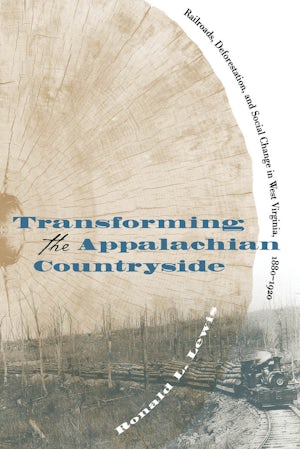Transforming the Appalachian Countryside
Railroads, Deforestation, and Social Change in West Virginia, 1880-1920
By Ronald L. Lewis
368 pp., 6 x 9, 32 illus., 2 graphs, 4 maps, notes, bibl., index
-
Paperback ISBN: 978-0-8078-4706-0
Published: June 1998 -
E-book EPUB ISBN: 978-0-8078-6297-1
Published: November 2000 -
E-book PDF ISBN: 979-8-8908-6923-4
Published: November 2000
Buy this Book
- Paperback $42.50
- E-Book $29.99
Awards & distinctions
A 1998 Choice Outstanding Academic Title
1999 West Virginia Governor's Award
Virginia provides an ideal site for studying the broader social impact of deforestation in Appalachia, the South, and the eastern United States.
Most of West Virginia was still dominated by a backcountry economy when the industrial transition began. In short order, however, railroads linked remote mountain settlements directly to
national markets, hauling away forest products and returning with manufactured goods and modern ideas. Workers from the countryside and abroad swelled new mill towns, and merchants ventured into
the mountains to fulfill the needs of the growing population. To protect their massive investments, capitalists increasingly extended control over the state's legal and political systems.
Eventually, though, even ardent supporters of industrialization had reason to contemplate the consequences of unregulated exploitation. Once the timber was gone, the mills closed and the railroads pulled up their tracks, leaving behind an environmental disaster and a new class of marginalized rural poor to confront the worst depression in American history.
About the Author
Ronald L. Lewis is Stuart and Joyce Robbins Chair in History at West Virginia University.
For more information about Ronald L. Lewis, visit
the
Author
Page.
Reviews
"A major scholar of Appalachian history has brought together, synthesized and made sense of much of the debate and literature that have characterized the field of Appalachian history for the past two decades. . . . A very fine book that will be of enormous use to Appalachian historians in the future."--Journal of Social History
"Lewis’s superb study of the logging industry in West Virginia . . . provides the best account yet of how industrialization transformed the Appalachian forests at the turn of the century."--Journal of American History
"An important contribution to the growing body of scholarly writing that has been revising the idea of Appalachian exceptionalism for the past decade. . . . Will help banish forever the persistent social construct of a people and region somehow set apart from the major developmental currents of late-nineteenth- and early-twentieth-century industrial capitalism. . . . Meticulously researched, well written, and enhanced by dozens of poignant photographs. It is a welcome addition to the growing body of literature on the dynamism of a rural-industrial society historically dismissed as static."--Journal of Southern History
"The most important recent book on Appalachian society. . . . Lewis’s book stands virtually alone."--American Historical Review
"A thorough and detailed account of the emergence, florescence, and decline of the timber industry in West Virginia, in particular in five of the state's Allegheny Highland counties."--Environmental History
"A very useful book that will be of great value to historians of agriculture, but also to those interested in the history of American environment, politics, law, and Appalachia."--Agricultural History Journal




